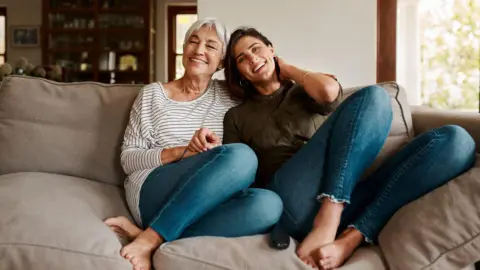 Getty Images
Getty ImagesAn impression – or possibly a fear – that 20-somethings are still hanging about in the family home is based on fact, an influential think-tank has concluded.
The proportion of 25 to 34-year-olds still living with their parents has increased by more than a third in nearly two decades, according to the Institute for Fiscal Studies (IFS).
The living at home trend has been driven by men, and those in their late 20s, researchers found.
High renting costs and rising house prices were the most significant reasons for the change.
Still filling the nest
In 2006, some 13% of people in the UK aged between 25 and 34 were living with their parents.
By last year, that had increased to 18%, according to the IFS – an independent economic think-tank.
That equates to about 450,000 more young adults still living in the family home – with the increase concentrated on those in their late 20s, researchers found.
Of 25 to 34-year-olds, men were more likely than women to be living at home, at 23% compared with 15%.
The IFS said that this age group had changed over recent decades, so had become less likely to be married and have children. They were also more ethnically diverse, and UK-born young people from Bangladeshi and Indian backgrounds were more likely to live with their parents.
The peak of adult children living at home was during the pandemic, when more than a fifth of 25 to 34-year-olds did so.
Now, in more normal times, parents may hope their grown-up children would fly the nest, but many of the 20-somethings would wish they could afford to do so.
The IFS said finances were a significant sticking point, with rising rents and house prices fuelling the trend.
 Zach Murphy
Zach MurphyOne 25-year-old who moved back into his parents’ home was Zach Murphy, from London, who had previously shared a flat with two friends. He told the BBC about his concerns, as the BBC’s new housing tracker showed the challenges facing the government’s housebuilding target.
Studying for a Masters degree in Environmental Science, Zach was inspired by the ambition of a better job, but renting on his own was “out of the question, unless you want to live in a shoe box”, and buying still feels out of reach.
“It’s getting harder to save. It feels like there is no hope getting on the housing ladder in London,” he said.
In April, Jess Waring-Hughes, a 32 year-old business manager, told of how she was saving furiously to buy a home on her own.
Moving back with her parents had felt “weird” as she had moved into her childhood room, and meant she was in danger of regressing to teenage ways.
Savings challenge
The IFS concluded that some young people could make savings by living at home. About 14% had accumulated more than £10,000 in a two-year period, compared with an estimated 10% of young adults in private rented accommodation.
However, this was not true across the board owing to the potential of higher commuting costs, or because some had moved owing to financial difficulties.
“For some, living with parents provides an opportunity to build up savings more quickly than if they were renting – which is an especially valuable advantage in high-cost places like London,” said Bee Boileau, research economist at IFS and an author of the report.
“However, others are likely to be living at a parental home due to a bad shock of some kind – such as the end of a relationship or a redundancy – or simply because they cannot afford to live independently.”
Housing is one of the biggest issues for people contacting us through Your Voice, Your BBC News.
